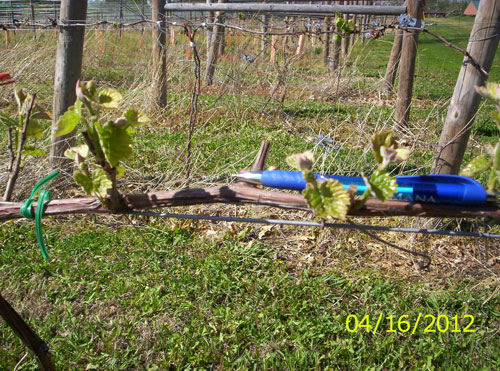Inside Look at Missouri Wine Tech Group
On May 15th, the Missouri Wine Technical Group held a Norton Workshop. The workshop was an opportunity for winemakers from across Missouri and the Midwest to share information about Norton winemaking in a formal, blind tasting environment. Media access to the closed-door workshops is not permitted. However, for the first time, the newly elected President of the Technical Group, Jacob Holman, winemaker at Les Bourgeois Vineyards, agreed to speak in detail about the workshops.
Please explain the format of the Missouri Wine Technical Group workshops.
We started in 2008 and conduct three workshops a year each focusing on a varietal, plus we include Norton every year. The way our workshops operate is a winemaker submits an unfinished wine – we prefer it not to be bottled – and the entire group of winemakers tastes the wine blind. Then we break up into groups of six to eight. Everyone evaluates the wines individually and then a scribe gathers the group’s collective evaluation. Next, a moderator calls on each group to tell everyone what they think of the particular wine. Once all groups have spoken, the winemaker is ‘outed” and the winemaker stands up and talks about what he did, good or bad.
In most industries, competitors don’t critique each other’s products with the goal of improving them. What is it about the Midwest wine industry that allows for such cooperation?
Most people in the industry agree that the quality of Midwest wines hinges on our knowledge. The Tech Group is a way for small wineries to sit in the same room with bigger guys who have gone through similar issues. Although I’m with one of the bigger wineries, I learn something at every meeting. The basic premise is that while there might be reasons that one Norton is better than another, there’s no reason to have flawed wine. I think we are willing to help each other in the Midwest. We all recognize that the industry is growing and this sort of cooperation helps us compete.
How unique is this Missouri workshop? Do other forums like this exist?
When we started four years ago, I couldn’t find any similar workshops. The Missouri Wine Technical Group is about education and helping winemakers make better wines. I haven’t found this kind of workshop in other states, although I have heard, ‘Gee, I wish we had this in our state!” If the group got big enough perhaps we could foster a larger organization. For example, an Illinois or a Kansas technical group makes sense because we work with a lot of the same varietals. Expanding the group, that’s a dream of mine.
At the workshop, you tasted unfinished and problem Nortons. What Norton problems usually come up?
For example, problems include tanks not being topped. With an unfilled tank, SO2 levels will be low— that causes wine to oxidize. To solve this, I go to an extreme and advise that if you have 350 gallons, and you only have a 300 gallon tank, fill up the 300 gallon tank; even if it means throwing away 50 gallons. This issue applies to all wines. In regard to Norton particularly, today we had a speaker talk about oak management. Oak is not specific to Norton, but it can be a problem with this varietal. That ‘s because Norton’s tannin structure is light. There’s not much natural tannin in the fruit. So it’s important to manage tannins and manage oak which provides tannins to be able to stabilize your color and make a bolder wine style that is agreeable.
Winemakers often say that Norton is hard to make. Would you advise beginning with something easier, like Chambourcin?
No. I would never recommend not making Norton. I always advise that Norton is tricky and you may not want to make Norton as your first wine. But at the same time, Norton is manageable. I have learned a few Norton winemaking tricks here and there that I could share instead of discouraging people from trying to make it.
Can you tell us some of your tricks? You told us about one of them before, your reverse bleeding method.
I do a lot of different things that are not typically standard! To deal with the pH problem, I know that Norton has a high acidity so I will actually acidify Norton. After fermentation, I will drop the pH down to a microbial management level. The higher the pH, the more chance of a spoilage organism surviving. So you’re the safest with your preservatives if pH is at a lower level. Even though I have to add acid to make this happen and the wine will be relatively undrinkable for a few months, I will maintain that low pH and therefore maintain a sulfur level so I don’t have to worry so much about spoilage. When I finish the wine, I change it back to a higher pH and drop that acidity out. Once the wine is sterile filtered and bottled, in theory, you don’t have to worry about spoilage organisms anymore.
See related story: Les Bourgeois Vineyards Profile
In the workshops, is there disagreement about whether a wine has a problem or the exact nature of that problem?
Typically, if a wine has a problem, there won’t be disagreement. But there can be disagreement about what the problem is. So if I think the problem is high T.A. (total acidity) or V.A. (volatile acidity), somebody else might think it’s a sulfide problem for example. And sometimes a wine is “off” and we don’t know why.
After four years of workshops, are you finding that the Nortons you’re tasting now have fewer and less serious faults?
The people who attend the workshops and take them seriously have made huge improvements. Their wines have definitely improved. However, it is a work in progress and will take years. Only one person has become irritated with the workshops and not come back. I take pride in that because winemaking is something you put all your time and heart into. As long as you stay in your winery, your wine can seem fine. But once you get out there and start comparing apples to apples, sometimes you realize you have a problem. That’s hard for people to stomach. But for the most part, everybody’s accepted the group’s suggestions and worked on them at home.
What did you bring to the workshop today ?
The wine I submitted today was an unfinished 2011. It is very green and I wanted to see what people thought of it and learn what I could do to finish it a little better. The wine was well received and the criticisms were about the wine being young and having a lot of potential. In addition to time, maybe the wine needs a little more oak and maybe a little more structure. Those are all things that I can do before the wine is released.
How long can Norton be aged?
I think everybody agrees that bottled Norton can aged from two to ten years. It’s not like a Cabernet that has the tannins to hold up. We typically will age Norton in the barrel for 2 to 24 months. I think that is relatively standard within the industry.
Is there a difference between the technical skills and equipment you need to make a Norton, as opposed to another wine variety?
As far as equipment, no. As far as skills, yes. I’m not trying to promote Norton, but I have worked with vinifera and it is much easier to deal with. You don’t have the problems that you have with the Norton. That goes all the way from growing that grape to the finish.
What did the tasting today indicate about the progress of your endeavors to improve Norton?
As far as progress goes for the Missouri Wine Technical Group, I was very happy with the way things went today. I was also happy with the wine quality in general but believe if we had more wineries represented, then everyone would benefit even more. (Note: There were about 10 wineries at the May 15th meeting and Jacob’s goal is 30 wineries participating.) That’s the goal of the group, to get more membership and get more attendance.
What new varietals are you seeing more of?
The best example I can think of off the top of my head would be Valvin Muscat. I’ve noticed a lot of people growing it and we had some interest in that grape as the next Workshop. As far as consumers go, from what I hear in the tasting room and from what I see people buying, Vignoles is something that Missouri has a handle on. Today, people ask for Vignoles by varietal more so than anything else apart from Norton.
The fact that people are actually asking for their local grapes by name, that must be quite pleasing?
Yes it is. This is something that has only happened recently, within my short career over the last 12 to 13 years. When I started, no one ever asked for Norton or Vignoles by name, it was all, ‘Let me have your sweet white,” or, ‘Let me have your dry red,” but I believe that’s changing to some extent.
For more information on the Missouri Wine Technical Group see: http://www.missouriwine.org/industry/missouri-wine-technical-group



